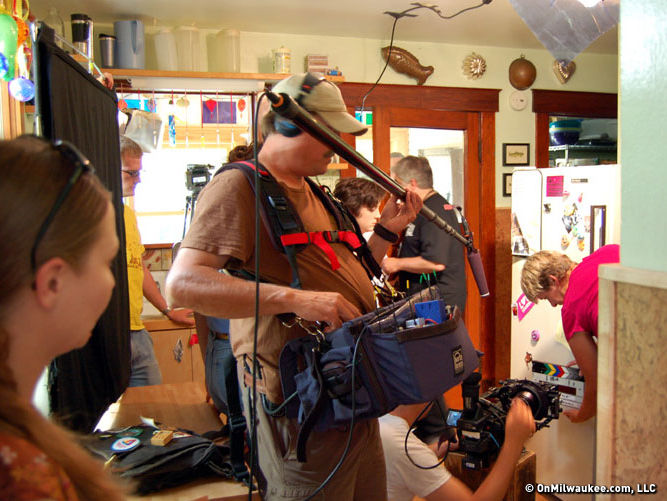The film crew inside the Arts and Crafts home in Wauwatosa stands frozen for a few seconds. The approach of the mailman outside has set the neighboring dog into a frantic bark, ruining the ambient sound recording. Once the civil servant has passed, there will be a good 15 minutes of shooting time before a pair of boys next door innocently starts bouncing a soccer ball.
“My shooting script,” laments director Karen Lindholm-Rynkiewicz, “specifically calls for no cicadas, no jackhammers…”
Suspended in a canvas chair swing outside and surrounded by teenage extras reading the final Harry Potter book is a young neophyte screenwriter from Menomonee Falls High School named Katrina Schwarz. From this backyard vantage point, she clasps her purse and stares into the kitchen/movie set. There’s a slim look of peculiar interest on her face.
“It’s weird, but it’s cool,” Schwarz says. “Everybody is working on something I wrote.”
The action begins and actress Gracie DeWolff (practically an alter-ego for Schwarz) opens the refrigerator to chat with a green bean casserole.
Welcome to the set of "Small Talk."
It is day two of a three-day shoot for the short film (15 minutes or under by the rules) that is the mid-result of the second annual Student Screenwriting Competition and workshop sponsored by the Milwaukee International Film Festival (MIFF). Buffeted by funding from festival sponsors like the Richard and Ethel Herzfeld Foundation and the Northwestern Mutual
Foundation, the program begins in March with high school students meeting and being mentored by local filmmakers regarding the filmwriting process.
It ends with one winning participant’s script turned into a real movie and premiering at the Oriental Theatre during MIFF’s Milwaukee Filmmaker’s Showcase night on Sept. 27.
“I thought of the story after I got the flyer, and wrote the treatment during Thanksgiving break,” says Schwarz. “That’s why a casserole comes into play.”
"Small Talk," according to a synopsis from Schwarz, is “about a girl who’s kind of a loner at school and then there’s this ‘goth’ guy who wants to get to know her. And she has this little brother who’s sick at home. We don’t know where the mom is, so the casserole starts talking to her.”
To say more would spoil it.
Schwarz’s script was so well-loved by many of the volunteer workshop mentors that Unit Production Manager/First Assistant Director Dan Wilson wondered how he could produce the film on his own if her script didn’t get picked up by the festival.
“I thought it was absolutely amazing,” says Wilson. “It’s this incredibly tender story about a girl trying so hard to find connection and how she fits into the world.”
“It’s the most complete script, to have a beginning, middle, and end. Each character has their own arc. It had believable dialogue,” says Lindholm-Rynkiewicz.
Not bad for someone who recently took up English to avoid math. Schwarz says she watched a lot of foreign short films (especially Japanese) and was inspired by the terse way people communicated in them. Her script reads like something from David Mamet with a little Samuel Beckett thrown in there.
Mark Metcalf, best known as an actor from "Animal House," as the Maestro on "Seinfeld," as a recurring villain called “the Master” on Buffy the Vampire Slayer, as a theater vet and as owner of Libby Montana in Mequon, is a guiding force in the local theater and film scene in Milwaukee -- especially for MIFF’s organizers. For the "Small Talk" project he has wore many hats, including wrangling youth actors from First Stage Children’s Theater.
As the kitchen scene begins again and DeWolff crosses the kitchen to open the fridge, Metcalf waits a beat then asks aloud: “doesn’t she have a line here?”
Director Lindholm-Rynkiewicz watches from DV monitor but is broken from her focus on the action.
“Oh! Yes she does. It’s ‘so are you ready to talk?’”
For once, Lindholm-Rynkiewicz is afforded the luxury of playing one part when the cameras roll. There are a lot of people pitching in to set up lights, figure out art direction and production issues, and learn from each other.
Everyone from makeup artists to the apprenticing production assistants work for free, food is often donated by restaurants and filming locations such as Wauwatosa East High School (day one of shooting) have been also donated.
Wilson surmises a week later that they’ve only spent around $4,000 of the budget, and that the rest has been a real work of passion and community. He says he loves being involved in this kind of straightforward filmmaking.
“Honestly, it ends up being a matter of resources. It’s interesting teaching the kids how to write the screenplay, and say ‘if you want to see this thing made, here’s what you want to do.’ Too many Hollywood films rely too much on the special or digital effects. You lose too much of the story, the character development arcs, through this story. This is great, to find more expressive ways with the way that one character looks or interacts with each other,” says Wilson.
Schwarz says hasn’t decided yet if she’s going to be a filmmaker or journalist, or perhaps even a foreign language professor. But soon she will join a pantheon of international filmmakers as well as local MIFF alums like Tate Bunker, Carlo Besasie, Adam Presti and Kyle Vande Slunt who have walked the red carpet in anticipation of their latest (short) film premiering to a large audience.



